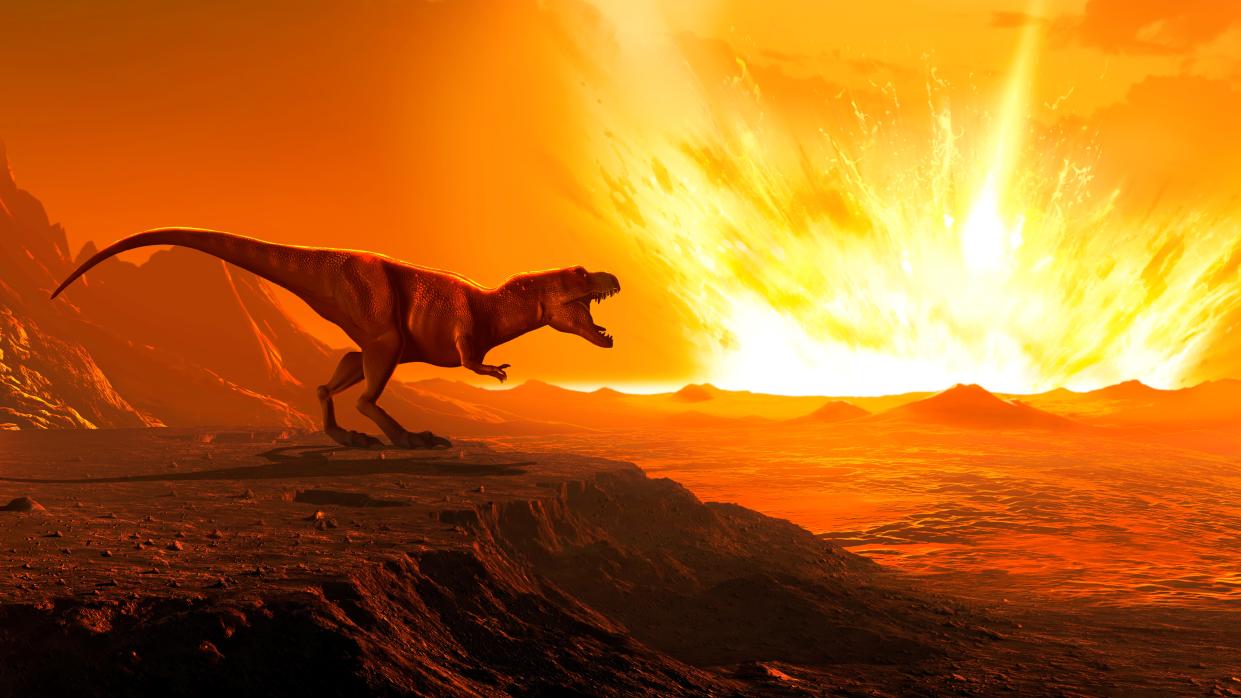Dinosaur-killing asteroid did not trigger a long 'nuclear winter' after all

The asteroid that wiped out the dinosaurs did not trigger a long-lasting impact winter, scientists have found — a discovery that raises new questions about what happened on Earth just after it hit.
One spring day 66 million years ago, a 6-mile-wide (10 kilometers) asteroid smashed into the Yucatán Peninsula and upended life on Earth. This event, called the Chicxulub impact, triggered a mass extinction that wiped out 75% of species, including all non-avian dinosaurs.
But how exactly it killed the dinosaurs is a bit of a mystery — after all, they weren't congregated beneath the asteroid, waiting to be squashed. For decades, scientists speculated that the impact tossed so much dust and dirt into the atmosphere that it triggered an "impact winter" (similar to a nuclear winter) — a period of prolonged cooling during which global temperatures plummeted.
However, a study published March 22 in the journal Geology tells a different story.
Related: Largest asteroid ever to hit Earth was twice as big as the rock that killed off the dinosaurs
"We found that there was no evidence for the 'nuclear winter,'" Lauren O'Connor, a geoscientist at Utrecht University in the Netherlands and first author of the study, told Live Science in an email. "At least, not in the resolution of our study," which would have detected temperature declines spanning 1,000 years or more.
O'Connor and her team analyzed bacteria fossilized in coal samples from before, during, and after the Chicxulub impact. In response to temperature changes, these bacteria thicken or thin their cell walls "like putting a blanket on or taking one off," she said.
The researchers found that in the millennia after the impact, the bacteria didn't seem to be bulking up for winter. Instead, they found a roughly 5,000 year warming trend that stabilized relatively quickly. These hot years may have been the result of super volcanoes belching CO2 into the atmosphere in the millennia leading up to the Cretaceous period's abrupt end.
This doesn't mean that an impact winter is off the table altogether, Sean Gulick, a geophysicist at the University of Texas at Austin who was not involved in the study, told Live Science. The blanket of dust kicked up by the asteroid may have only lingered in the atmosphere for a decade or less — not noticeably changing global temperatures, but plunging Earth into darkness. "It doesn't even need to be that long," said Gulick. "If you just had months without the sun, it would be enough to kill most of the plants in the world."
With so many plants gone, herbivores would have struggled to find enough food to eat. As these species died, it would have sent shockwaves up the food chain, killing off large carnivores and other species that depended on them. This event, while devastating, would have been a blip in the fossil record. "It's really, really fast geologically," Gulick said.
O'Connor's team agreed that there likely was a short period of cold and darkness at the start of the end-Cretaceous extinction. But it doesn't seem to have set off a long-term cooling trend.
RELATED STORIES
—Dinosaur leg might be from the day the asteroid struck, scientists claim
—How did birds survive the dinosaur-killing asteroid?
—Tsunami from dinosaur-killing asteroid had mile-high waves and reached halfway across the world
Their findings indicate that Earth may be capable of rebounding from a climate-changing event faster than previously thought — but not without triggering a mass extinction, O'Connor said.
The researchers now plan to investigate coal from more sites in the U.S. in order to piece together a record of temperature changes in the millennia leading up to the asteroid impact. They hope these data will help them disentangle the effects of volcanism from the Chicxulub impact, and that the parallels to volcanic warming give us a clearer idea of what to expect in our current climate crisis.

